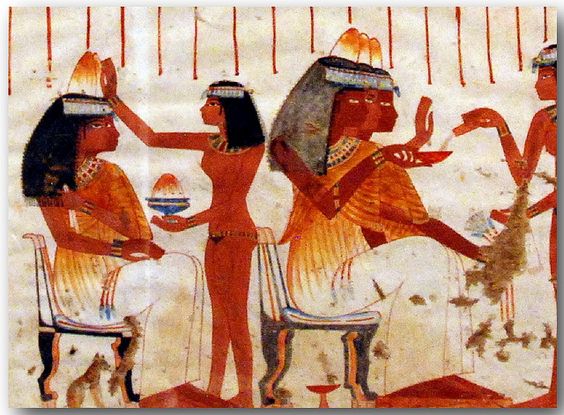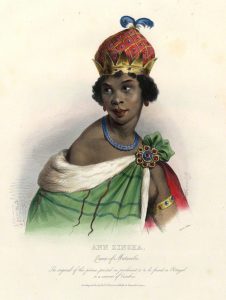The Egyptians, along with the other ancient civilizations, were complex societies. Their culture has many similarities with modern societies, one of which was their concern for beauty. Egyptians went to great lengths to ensure that they were portrayed as flatteringly as possible, rarely depicting their true age. Youth was seen as central to their concept of beauty.

When one looks at human depictions in the artwork of the ancient Egyptians, one may notice the black lines around their eyes. Upon closer attention to detail, one notices that it resembles the way girls today apply eyeliner. This is what was intriguing enough to spark questions about the Egyptian society’s views on cosmetics. Was it a statement of beauty? Of power? Did it relate to their status?
There is evidence to support the generalization that Egyptians may in fact have valued beauty even more than we do today. They expressed their fondness for beauty in their artwork. Their sculptures and paintings provide evidence for how they valued beauty. The value they saw in beauty is depicted in their paintings and sculptures, such as the bust of Nefertiti, which was made to make her look flawless. They also used eye paints (similar to today’s eyeliner), and it was typically made from malachite and galena. Eventually galena became the country’s primary eye paint, and both are found in tombs on pallets and stones that are believed to have been used in preparation of the paints.1
The image to the left is a statue from the Egyptian Museum of Cairo. This statue gives us a visual representation of the ideal form of a male. One may notice the square, wide shoulders, a slim, muscular figure, and a very defined face shape.

The image to the left is a bust of Nefertiti, the great Royal Wife of the Pharaoh Akhenaten. It is believed to be sculpted by Thutmose, who is believed to be the official court sculptor of Pharaoh Akhenaten.2 It was recovered in his workshop and is believed to have been sculpted in 1345 BCE. Nefertiti was a staple for beauty in her time, and her husband strove to make her co-equal with himself, making her one of the most powerful women ever to rule. Nefertiti was universally portrayed as beautiful, and her beauty can still be appreciated today. As one can see in this bust, the queen was sculpted to depict an exemplar of beauty, with a slim face, painted lips, long neck, and adornments on her head and clothes.3
It seems that maybe the Egyptians were more beauty crazed than people of our generation. It is apparent that the ancient Egyptians did not find pride or beauty in older ages. They preferred to alter the way they looked, instead of having themselves accurately represented. It gives us the impression that maybe this ancient culture is not as different from ours as we may have initially assumed.
- A. Lucas, “Cosmetics, Perfumes and Incense in Ancient Egypt,” The Journal of Egyptian Archaeology 16, no. 1/2 (1930): 41. ↵
- Who’s Who in Ancient Egypt, Routledge, 2003. s.v. “Thutmose (c. 1352 – 1366 BC), ” by Michael Rice. ↵
- Thutmose. Bust of Queen Nefertiti, Egyptian Museum Berlin, n.d. http://www.egyptian-museum-berlin.com/c53.php. ↵



65 comments
Ruben Basaldu
Even back in ancient times, people were worried about their appearance which is interesting to read about honestly. Now I am no makeup guru so I don’t really know that much about this kind of stuff but the fact that in ancient times they would use cosmetics similar to what people use today is actually really neat. People are still facing the problem of if they are considered beautiful because of societies standards but everyone is beautiful in their own unique ways.
Uzziyah Cohen
Although beauty may be in the eye of the beholder, it seems that the Egyptians cared much about how the public, in general, view them in terms of the looks and youth. It’s quite fascinating how cosmetic trends such as the use of eyeliner have remained consistent and are actually part of today’s society. Additionally, it is interesting how the Egyptians focused so much on the concept of beauty that it exuded from their beliefs through their artwork and writing. When this article referenced Nefertiti’s bust as an example of Egyptians view of beauty, it seemed more than accurate. Furthermore, the writer expressed The keen observation that many of our beauty trends may have originated in ancient Egypt.
Antonio Coffee
It is weird to think that the ancient world had the same issues that our modern world has today in regards to trying to portray themselves as beautiful. They had statues and portraits to work with but today we have social media and Instagram to work with. It can be kinda sad to think that they struggled with the same things that we did as it has been thousands of years but we are still in the same place. This is just an area that humanity needs to work on.
Samantha Ruvalcaba
What a fascinating comparison. Mentioning the use of eyeliner got me thinking, we didn’t really see it resurface in a big way until the 1990s. I wonder if it was one of the many things brought to use because of mercantilism or early cultural diffusion, or because of the introduction to television in the last century. I definitely think, as the writer mentioned, that there are comparisons. However, I also believe that beauty is a big staple in our modern day lives.
Matthew Swaykus
It makes sense that the ancient world had similar cosmetics to today, but I am surprised by the extend of how beauty focused it may have been. Though such desires can be considered base and have worked its way to becoming a common theme among human behavior, the shear amount of similarities seen between our societies is staggering to say the least.
Natalie Juarez
The concept of beauty is a social construct and it saddens me that people to this day believe that beauty is nothing more than what is on the outside. The idea of youth being the central concept of beauty during ancient Egypt is still central today because now women will go to extreme measures into looking as young as possible with surgery. I think this article was well written and organized but it could have been more informative. Yes, it states that women in Ancient women are concerned about beauty but I was not really convinced that they were more concerned back then since women today will still go to extremes to be “beautiful.”
Raymond Nash Munoz III
I grew up in house that taught me to appreciate and respect all women. With those teachings I grew the appreciation of all women’s natural beauty, so essentially I prefer not to wear make up. Its not that I feel that make up makes women unattractive, I just think that a woman is her best self when she isn’t trying to cover up herself. It actually doesn’t surprise me that women of Egypt obsessed over beauty more than today’s women, because in order to obtain high status in Egypt you had to come off as god-like, and someone who isn’t “beautiful” by the majority’s standards will remain at the bottom of society. In today’s world, people are being taught that no one’s appearance put them over another, because we all have our own special features and our faults. This amazing article got me thinking about how our society could be a whole lot worse, its not great, but its better than what it could be.
Indhira Mata
I personally do not wear makeup everyday, only on special occasions do I wear it. In the ancient world it looks like they spend everyday trying to look better than the last day and better than the other women. Beauty was very important to them and it seems that possible maybe even more because of how they changed their true appearance. Today you only see those with money change their figure, but back then everyone did. This is possible evidence that females have always been into their outer beauty.
Emily Jensen
Most days when you’re on any form of social media, it is easy to believe that humanity is, at our core, extremely vain. The Egyptians, much like Americans today, were infatuated with the concept of youthfulness. They would do anything to stay young, to never appear to be growing old. I liked that the author stated her belief, that Egyptians were more concerned with beauty than we are today, and then supported her claim with evidence.
Honoka Sasahara
I thought that the definition of beauty in ancient Egypt was similar to that in the world now. In ancient Japan, those who had low nose and flat face were defined to be beautiful, but such kind of face is no more attractive so much there. Egyptian people must have kept inheriting the idea about beauty to next generations with pride.